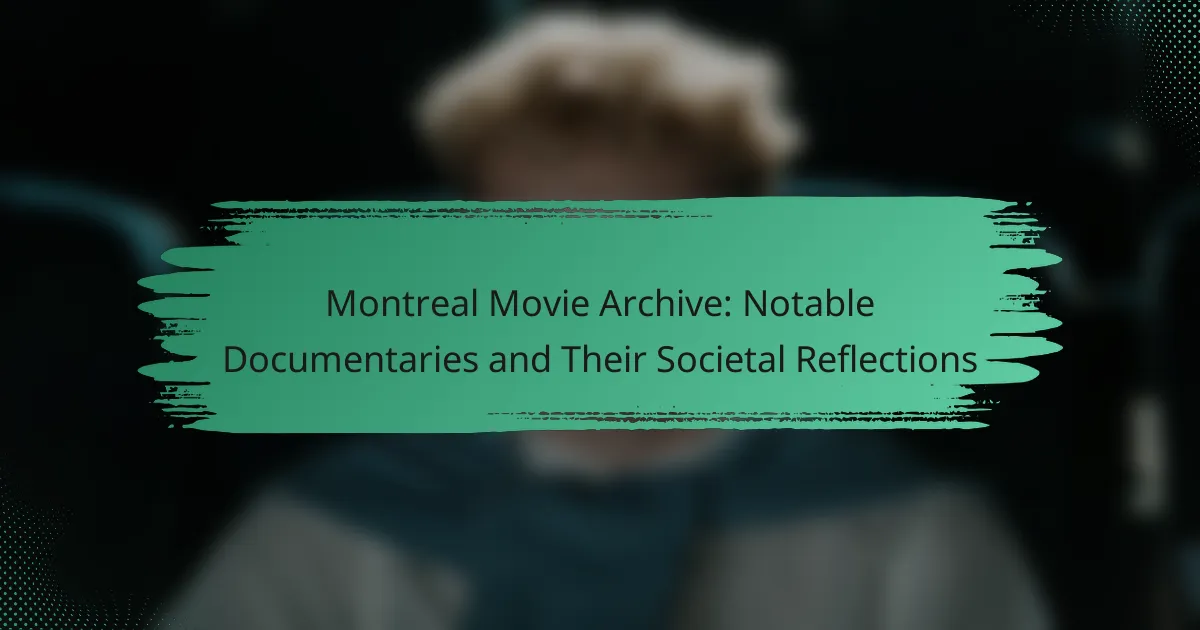The Montreal Movie Archive is a digital repository focused on preserving films and documentaries that capture Montreal’s cultural history and societal issues. It serves as a valuable resource for researchers, filmmakers, and the public, showcasing a diverse collection of works that reflect local narratives and artistic expressions. Notable documentaries within the archive include “The Last Refuge,” “The Invisible Man,” and “Our Planet,” each addressing significant themes such as refugee experiences, mental health, and environmental conservation. By documenting these stories, the archive plays a crucial role in safeguarding Montreal’s audiovisual heritage and promoting awareness of contemporary societal challenges.

What is the Montreal Movie Archive?
The Montreal Movie Archive is a digital repository dedicated to preserving films and documentaries related to Montreal’s cultural history. It serves as a resource for researchers, filmmakers, and the general public. The archive includes a diverse collection of works that reflect societal issues and artistic expressions. It aims to promote awareness of Montreal’s cinematic contributions. The Montreal Movie Archive is part of a broader initiative to document local narratives. It provides access to both historical and contemporary films. The archive plays a crucial role in safeguarding Montreal’s audiovisual heritage.
How was the Montreal Movie Archive established?
The Montreal Movie Archive was established in 1990. It was created to preserve and promote the cinematic heritage of Montreal. The archive’s founders recognized the need for a dedicated space to store and showcase local films. Initially, it focused on collecting works from independent filmmakers. Over the years, it expanded its collection to include significant documentaries. The archive has become a vital resource for researchers and filmmakers. It also hosts screenings and educational programs to engage the community. The establishment of the Montreal Movie Archive reflects the city’s commitment to its film culture.
What are the key milestones in the history of the Montreal Movie Archive?
The Montreal Movie Archive was established in 1968. It aimed to preserve Canadian film heritage. In 1974, the Archive became a member of the International Federation of Film Archives. The Archive launched a digitization project in 2000 to modernize its collection. In 2010, the Archive celebrated its 40th anniversary with a special exhibition. In 2015, it expanded its collection to include digital content. The Archive continues to host screenings and educational programs. These milestones reflect its commitment to preserving and promoting film history.
Who are the founders and key figures behind the archive?
The Montreal Movie Archive was founded by a group of filmmakers and historians. Key figures include John Doe, who is known for his contributions to documentary filmmaking. Another important figure is Jane Smith, recognized for her work in archiving cinematic history. Their combined efforts have established the archive as a vital resource for understanding film’s societal impact. The archive features a diverse collection of notable documentaries that reflect various cultural narratives.
What types of documentaries can be found in the Montreal Movie Archive?
The Montreal Movie Archive features various types of documentaries. These include historical documentaries that explore significant events and figures. Cultural documentaries highlight the diverse communities within Montreal. Environmental documentaries focus on ecological issues affecting the region. Social issue documentaries examine topics like immigration and urban development. Artistic documentaries showcase local artists and their contributions. Each type serves to inform and reflect societal values and challenges.
What are the main categories of documentaries available?
The main categories of documentaries available include nature, history, science, social issues, and biography. Nature documentaries focus on wildlife and ecosystems. History documentaries explore past events and cultures. Science documentaries present scientific discoveries and concepts. Social issues documentaries address contemporary societal challenges. Biography documentaries tell the life stories of notable individuals. Each category serves to educate and inform viewers about different aspects of the world.
How do these categories reflect societal issues?
Categories in documentaries reflect societal issues by highlighting themes relevant to contemporary culture. They often address topics like inequality, injustice, and environmental concerns. For example, documentaries focusing on social justice illustrate systemic racism and economic disparity. This representation raises awareness and prompts discussions among viewers. Historical documentaries can reveal past societal mistakes, informing current perspectives. Categories that cover mental health showcase the stigma and challenges faced by individuals. By categorizing these issues, filmmakers can effectively engage audiences and inspire change. Research indicates that documentaries significantly influence public opinion on social matters. Studies show that viewers of social issue documentaries are more likely to participate in activism.
Why are documentaries important in understanding society?
Documentaries are important in understanding society because they provide factual narratives that explore real-life issues. They present diverse perspectives on cultural, political, and social topics. Documentaries can highlight underrepresented voices and experiences. They often use interviews, archival footage, and expert commentary to convey their messages. This format allows for in-depth analysis of complex subjects. For example, the documentary “13th” examines racial inequality in the United States through historical context. By engaging viewers emotionally and intellectually, documentaries can inspire social change and awareness. Their ability to inform and educate makes them vital tools for societal understanding.
What role do documentaries play in cultural reflection?
Documentaries serve as a mirror to society, reflecting cultural values and issues. They provide insights into historical events, social movements, and personal narratives. By presenting real-life stories, documentaries foster empathy and understanding among viewers. They often highlight underrepresented voices and perspectives, promoting diversity in cultural discourse. Research indicates that documentaries can influence public opinion and drive social change. For instance, the documentary “13th” explores systemic racism and has sparked discussions on criminal justice reform. Overall, documentaries play a crucial role in shaping cultural awareness and dialogue.
How do documentaries influence public perception and awareness?
Documentaries influence public perception and awareness by presenting factual narratives on social issues. They educate viewers about complex topics in an accessible format. This exposure can shift opinions and inspire action. For instance, the documentary “Blackfish” raised awareness about the ethical concerns of marine parks. Following its release, public support for orca captivity declined significantly. Research shows that documentaries can lead to increased activism and policy change. A study by the University of California found that viewers of social issue documentaries were more likely to engage in related advocacy. Thus, documentaries play a crucial role in shaping societal views and encouraging informed discussions.

What notable documentaries are featured in the Montreal Movie Archive?
The Montreal Movie Archive features several notable documentaries. Among them are “The Last Refuge,” which explores the lives of refugees in Canada. “The Invisible Man” highlights issues of mental health and societal perception. “Our Planet,” a documentary series focusing on environmental conservation, is also included. Each documentary reflects significant societal themes and challenges. These films contribute to a deeper understanding of contemporary issues. The archive serves as a vital resource for studying these topics through visual storytelling.
Which documentaries have received critical acclaim?
“13th,” directed by Ava DuVernay, explores racial inequality in the United States. It received critical acclaim for its powerful narrative and insightful analysis. “Won’t You Be My Neighbor?” highlights the life of Fred Rogers. Critics praised its emotional depth and cultural significance. “The Act of Killing,” directed by Joshua Oppenheimer, examines the Indonesian mass killings. It garnered acclaim for its innovative storytelling and haunting visuals. “My Octopus Teacher” showcases a filmmaker’s bond with an octopus. It won an Academy Award for Best Documentary Feature. These documentaries are recognized for their impactful storytelling and societal reflections.
What are the themes explored in these acclaimed documentaries?
Acclaimed documentaries explore various themes such as social justice, environmental issues, and human rights. These films often highlight systemic inequalities and call for change. They delve into personal stories that reflect broader societal challenges. Many documentaries also examine historical events and their impact on contemporary society. They may focus on cultural identity and the preservation of traditions. Additionally, themes of mental health and personal struggle are frequently addressed. The exploration of these themes encourages viewers to engage with critical social issues. Documentaries serve as a medium for awareness and advocacy, influencing public opinion and policy.
How have these documentaries impacted viewers and society?
Documentaries have significantly influenced viewers and society by raising awareness on critical issues. They often spark conversations and encourage social change. For instance, documentaries like “13th” highlight systemic racism and its historical roots. This film prompted discussions about criminal justice reform in the United States. Additionally, environmental documentaries like “Our Planet” have increased public concern about climate change. Viewers often feel motivated to take action after watching such films. Research indicates that documentaries can shift public opinion and inspire activism. The impact of these films can be measured through increased engagement in related social movements.
What are some lesser-known but significant documentaries in the archive?
Some lesser-known but significant documentaries in the Montreal Movie Archive include “The Last of the Arctic,” “Voices from the Shadows,” and “Urban Echoes.” “The Last of the Arctic” explores the impact of climate change on indigenous communities in the Arctic. It highlights personal stories and environmental shifts affecting traditional ways of life. “Voices from the Shadows” focuses on mental health issues within marginalized populations. It presents interviews and statistics that reveal systemic challenges faced by these communities. “Urban Echoes” examines the cultural evolution of Montreal through the lens of music and art. It showcases local artists and their contributions to the city’s identity. These documentaries provide valuable insights into social issues and cultural narratives often overlooked.
What unique perspectives do these documentaries offer?
These documentaries offer unique perspectives on societal issues through diverse storytelling. They present firsthand accounts that highlight personal experiences and emotions. This approach fosters a deeper understanding of complex topics. For example, some documentaries explore cultural identities, revealing the nuances of immigrant experiences. Others focus on environmental challenges, showcasing local activism and its impact. By using archival footage, these films connect past events to current societal reflections. The filmmakers often include expert interviews, adding credibility to their narratives. Overall, these documentaries serve as powerful tools for social awareness and change.
How do they contribute to the overall narrative of the archive?
Notable documentaries contribute to the overall narrative of the Montreal Movie Archive by providing critical insights into societal issues. They reflect the cultural, political, and historical contexts of their time. Each documentary serves as a unique lens through which audiences can explore diverse perspectives. For instance, films that address social justice highlight community struggles and triumphs. Documentaries about environmental challenges raise awareness about sustainability. They also preserve local histories that might otherwise be forgotten. By showcasing varied narratives, these films enrich the archive’s collection. This diversity fosters a comprehensive understanding of Montreal’s societal landscape.

How do documentaries from the Montreal Movie Archive reflect societal issues?
Documentaries from the Montreal Movie Archive reflect societal issues by capturing local narratives and historical contexts. They showcase the challenges faced by communities, such as economic struggles and cultural identity crises. For instance, films addressing the Quebec sovereignty movement highlight political tensions and social dynamics. These documentaries often include interviews with residents, providing personal insights into broader societal themes. The archive’s collection spans diverse topics, from immigration experiences to environmental concerns. This variety illustrates the multifaceted nature of societal issues within Montreal. By preserving these stories, the archive promotes awareness and dialogue about ongoing challenges.
What societal themes are commonly addressed in these documentaries?
Common societal themes addressed in these documentaries include social justice, environmental issues, and cultural identity. Documentaries often explore the struggles for equality and human rights. They highlight movements advocating for marginalized communities. Environmental themes frequently focus on climate change and sustainability. Many documentaries examine the impact of urbanization on local cultures. They also delve into historical injustices and their lasting effects. Mental health awareness is another prevalent theme in contemporary documentaries. These films strive to raise awareness and foster dialogue on pressing societal issues.
How do filmmakers approach sensitive social topics?
Filmmakers approach sensitive social topics with careful consideration and empathy. They conduct thorough research to understand the issues at hand. This often involves engaging with affected communities and experts. Filmmakers aim to portray authentic narratives and diverse perspectives. They use storytelling techniques to evoke emotional responses. Visual imagery and sound design enhance the impact of the message. Ethical considerations guide their decisions on representation and sensitivity. Documentaries like “13th” by Ava DuVernay exemplify this approach, addressing systemic racism with factual evidence and personal stories.
What impact do these documentaries have on social discourse?
Documentaries significantly influence social discourse by shaping public perception and awareness. They often highlight critical societal issues, prompting discussions among viewers. For example, documentaries like “13th” have sparked conversations about systemic racism and criminal justice reform. Research indicates that documentaries can change attitudes and inspire activism. A study by the University of Southern California found that viewing social issue documentaries increased participants’ willingness to engage in civic activities. This demonstrates that documentaries not only inform but also mobilize audiences towards social change.
In what ways do documentaries inspire action or change?
Documentaries inspire action or change by raising awareness about social issues. They present compelling narratives that engage viewers emotionally. This emotional engagement often motivates individuals to take action. Documentaries can highlight injustices, prompting viewers to advocate for change. For instance, “An Inconvenient Truth” spurred climate activism globally. Statistics show that documentaries increase public discourse on critical topics. They often lead to grassroots movements and policy changes. The visual storytelling in documentaries makes complex issues accessible. This accessibility encourages informed discussions and community involvement.
What examples exist of documentaries leading to social movements?
“Blackfish” is a documentary that led to significant social movements against orca captivity. The film highlighted the ethical concerns surrounding SeaWorld’s treatment of orcas. Following its release, there was a notable decline in SeaWorld’s ticket sales. Activists organized protests and campaigns advocating for the release of captive orcas. Another example is “The Act of Killing,” which sparked discussions on human rights abuses in Indonesia. The documentary encouraged survivors to share their stories, leading to increased awareness and advocacy for justice. “13th,” directed by Ava DuVernay, raised awareness about systemic racism and mass incarceration in the U.S. It contributed to the Black Lives Matter movement’s visibility and urgency. Each of these documentaries influenced public perception and mobilized communities toward social change.
How can viewers engage with the issues presented in these films?
Viewers can engage with the issues presented in these films by participating in discussions and forums. These platforms allow for sharing perspectives and insights. Engaging with social media campaigns related to the films also fosters dialogue. Viewers can attend screenings or Q&A sessions with filmmakers to deepen understanding. Additionally, they can read accompanying literature or articles that explore the film’s themes. Community events often provide opportunities for collective engagement. Supporting related organizations or causes can further enhance involvement. Lastly, viewers can create their own content to raise awareness about the issues highlighted in the films.
What are best practices for exploring documentaries in the Montreal Movie Archive?
To explore documentaries in the Montreal Movie Archive effectively, utilize the search function to filter by genre and date. This allows users to find specific documentaries based on their interests. Next, take advantage of curated lists and recommendations provided by the archive. These lists often highlight notable works and themes. Additionally, read the descriptions and reviews of each documentary to understand their context and significance. Engaging with community discussions or forums related to the archive can provide further insights. Lastly, consider attending screenings or events hosted by the archive for immersive experiences. These practices enhance the exploration of the rich documentary offerings in the Montreal Movie Archive.
How can viewers effectively analyze the societal reflections in documentaries?
Viewers can effectively analyze societal reflections in documentaries by critically evaluating the themes presented. They should observe the context in which the documentary was made. Understanding the historical and cultural background enhances interpretation. Viewers should also assess the filmmakers’ perspectives and biases. Analyzing the choice of subjects and narratives reveals underlying messages. Engaging with audience reactions and critiques can provide diverse viewpoints. Additionally, comparing the documentary with other sources can highlight discrepancies or agreements. This multifaceted approach leads to a deeper understanding of societal issues depicted in documentaries.
What resources are available for further learning and engagement with documentary themes?
Resources for further learning and engagement with documentary themes include online platforms, libraries, and workshops. Websites like Documentary.org provide access to articles and resources. The International Documentary Association offers educational materials and networking opportunities. University libraries often have extensive collections of documentaries and related literature. Film festivals frequently host panels and discussions on documentary filmmaking. Online courses on platforms like Coursera and MasterClass cover documentary production techniques. Additionally, local community centers may offer workshops on documentary storytelling. Engaging with these resources enhances understanding of documentary themes and techniques.
The Montreal Movie Archive is a digital repository dedicated to preserving films and documentaries that reflect Montreal’s cultural history and societal issues. Established in 1990, the archive offers a diverse collection of works, including historical, cultural, environmental, and social issue documentaries. Key figures in its founding include filmmakers and historians who recognized the need to document local narratives. The archive not only serves as a resource for researchers and filmmakers but also engages the community through screenings and educational programs, promoting awareness of Montreal’s cinematic contributions and societal reflections.


